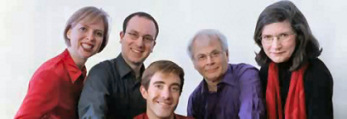Da
Capo on Shuffle: Da Capo Chamber Players, Matthew Cody (conductor),
The Knitting Factory, New York City, 24.01.2006 (BH)

Eric Moe: Hey Mr. Drummachine Man (2004)
Philippe Hurel: Pour Luigi (1994)
Derek Bermel: Language Instruction (2003)
Gene Pritsker: Sorrow, Like Pleasure, Creates Its
Own Atmosphere (2003)
Kyle Gann: The Day Revisited (2005)
Martin Bresnick: Bird As Prophet (1999)
Michael Gordon: ac dc (1996)
Da Capo Chamber Players
Patricia Spencer, flute
Meighan Stoops, clarinet
David Bowlin, violin
André Emilianoff, cello
Blair McMillen, piano
Guest Artists
Dennis DeSantis, dj
Kyle Gann, keyboard
Bernard Gann, electric bass
Matthew Cody, conductor
With an electronic “pseudo-canned drumbeat” as anchor,
Eric Moe’s Hey Mr. Drummachine Man offered pianist
Blair McMillen the chance to show his considerable chops
as well as his sense of humor. The slightly cheesy beat
jumps right in, then continues inexorably as the pianist
rides above it – sort of “Bartók meets techno” (as well
as 1970s television, it turns out, with a canny reference
to the theme music from The Phil Donahue Show).
If it wasn’t an exercise in profundity, it slyly set the
tone for the Da Capo Chamber Players’ excursion into some
repertoire they don’t usually encounter.
Changing the mood completely, the insightful conductor
Matthew Cody guided the ensemble in Philippe Hurel’s Pour
Luigi, with echoes of Andriessen and Messiaen in its
chords often separated by silence. Hurel has professed
an interest in combining jazz and funk rhythms with harmonies
achieved through spectral techniques, and this intriguing
piece is perhaps the apotheosis of this exploration.
Da Capo produced lush, mouth-watering textures, all deftly
coordinated by Mr. Cody in one of the highlights of the
evening.
The first half concluded with Derek Bermel’s entertainingly
goofy Language Instruction, with nimble stage direction
by David Cote. Bermel is an outstanding clarinetist who
often writes with a theatrical bent, and some of his works,
to be effective, require much more than merely learning
the scores. Inspired by his experience with Portuguese
language tapes, Bermel has constructed a mini-drama in
which the clarinet – the versatile Meighan Stoops – tries
to “teach” phrases to the rest of the players. As Ms.
Stoops “explained” a glissando figure to the other musicians,
some were able to mimic it immediately, but Mr. McMillen
responded with puzzlement, since the piano can’t really
duplicate the woodwind timbre. One could draw many conclusions
from the humorous chaos that ensued, but perhaps Mr. Bermel
is commenting on the rehearsal process itself.
Gene Pritsker’s title is from Balzac’s novel Cousin
Bette, and is scored for flute and samplestra, an
“orchestra” of sampled sounds including Indian voice and
flute, drums and electronics. Patricia Spencer offered
sensitive playing to complement Pritsker’s waves of perpetual
motion, creating a dreamlike landscape of fluttering,
twittering sounds, breathing and eerie vocals. Microtones
figure prominently in Kyle Gann’s The Day Revisited,
based on a 29-note octave, clustered around a droning
D note. After a couple of false starts (apparently a
keyboard was not cooperating, and this time not in jest,
either) the ensemble settled into a satisfying groove,
creating a clouds of floating timbres using Gann’s self-described
“simple harmonies.”
I’ve now heard Martin Bresnick’s sensuous Bird
As Prophet two or three times, and without a doubt,
David Bowlin’s alert violin work puts him at the top of
the interpretive list. The title is a reference to Schumann’s
piano miniature from Waldszenen, invoked with jazz
great Charlie Parker. With Mr. McMillen in rapturous
form on piano, Bowlin expertly characterized the work’s
rhapsodic, not-quite-tonal episodes, all imbued with a
slightly melancholic tone – gorgeous.
The evening ended with more Andriessen-esque precision
with Michael Gordon’s exhilarating ac dc, which
the composer explains in typically terse style, “refers
to electrical currents.” There was certainly no shortage
of wattage by Ms. Spencer, Ms. Stoops, Mr. Bowlin, cellist
André Emilianoff and Mr. McMillen. If any of these works
were to embody the night’s aesthetic and show the mettle
of these outstanding players, this grueling piece (as
well as the Hurel) might be the one. Further, the Knitting
Factory’s intimate caverns are known primarily for housing
alternative rock and jazz, but the place works remarkably
well for a Da Capo, celebrating its 35th anniversary
this season and seemingly reinventing itself in the process.
Bruce
Hodges
Photograph
by Peter Mitev



